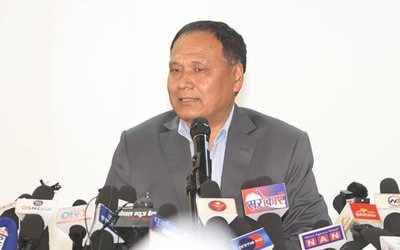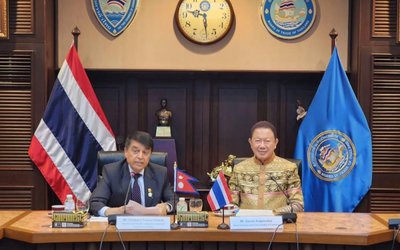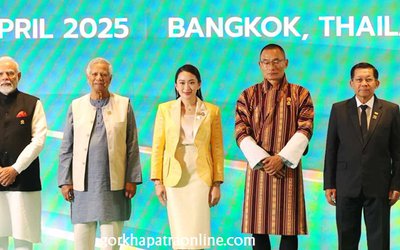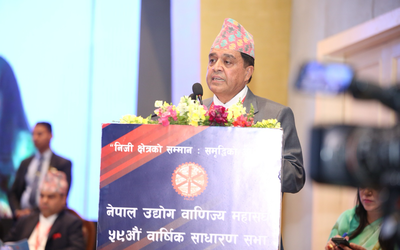
Trade of any kind involves the country’s interest. Nepal’s current electricity trade is no exception. As an importer of Nepalese electricity, India would have certain terms and conditions for import of the electricity.
In business dealings, it is an obligation of Nepal to address them. India is allowing the import of electricity generated from projects with investment from India and countries other than China. The Indian government has expressed its unwillingness to purchase the electricity generated from the projects with any kind of Chinese investment and involvement.
By allowing the electricity generated by two projects constructed under German cooperation, two under Indian cooperation, one by ADB and other India Nepal joint ventures, India has shown its preference.
Not allowing 456MW Upper Tamakosi in the trade, India has shown that it cannot purchase the electricity not only from the projects constructed through Chinese investment but also electricity generated by the projects constructed by the Chinese companies.
Although three major contractors of 456 MW Upper Tamakoshi projects are Indian, the government of India does not consider this project to purchase the electricity.
Former minister Dipak Gyawali said that Nepal is exporting electricity to India in cheaper prices. Instead of focusing on export Nepal should focus on increasing internal consumption.
Gyawali said that India considers Nepal’s water as strategic resource and is interested in regulating it on that basis. “All concerned stakeholders should give up the dream that Nepali will be rich by selling electricity to India. We must increase domestic consumption,” said Gyawali.
Addressing a program organized by Association of Former Career Ambassadors of Nepal (AFCAN), speakers said that India’s restrictions not only limit Chinese investment but also the project constructed by Chinese companies and Chinese technology.
However, Managing Director Nepal Electricity Authority Kul Man Ghising expressed his confidence that Nepal can generate huge amount of money exporting electricity to India. Presenting his key statement, he said that the investors need to take the concern of India and its choice if they intend to export the electricity to India.
“Our current trade with India has shown that electricity is only product in Nepal to have greater market advantage. If there is a market, we need to catch it up,” said MD Ghising. He also said that the myth in Nepal that Nepal cannot export electricity to India proved wrong following our trade of 360 MW of electricity to India.
“Our electricity development is also connected with geo-politics. We are inviting foreign investment in hydropower and most of the companies are Chinese,” said Ghising. “We need to invite more direct investment from India to increase our export.” NEA is developing a project in a joint venture with India’s state owned company in Arun valley,” said Ghising.
However, we can make changes in the stand in the course of negotiations. In earlier directive, India has made a condition for 50 percent Indian investment for the export of electricity to India. After continual request from Nepal, India amended the directives. The procedure of the current regulation is dynamic. However, Indian policy now is not to purchase electricity generated from a project financed by China and constructed by the Chinese companies.
During the India visit by Prime Minister Sher Bahadur Deuba in April, India assured us to open market for Nepalese electricity. He said that a feasibility study is underway to construct transmission line connecting China. Modality for the construction of Rasuwa-Kerung Cross border Transmission line is yet to develop. Chinese are constructing Transmission line from Lhasa and there are no problems in Nepali side.
Geo-politics is the main reason behind delaying the construction of west-Seti project. We have discussed several times but we are unable to assure Chinese on the market in India. Our sole market is India. Similarly, we are unable to sign PPA on Chinese demand.

As Nepal Bangladesh Electricity trade has a big potential, Nepal and Bangladesh are now discussing on market. Ghising said that the time has come for Nepal to think energy security till 2050. He said that due to lack of integrated project among the government agencies, there is a problem for larger project.
We have constructed settlement roads and other infrastructure in the areas selected for larger storage project. Given the current state of development, construction of larger project is impossible in next 50 years.
If we do not construct larger projects, we will be unable to fulfill energy demand and water demand for the increasing population. This will bring a major challenge for energy and food security.
Ghising said that Nepal India electricity trade is now going very smoothly and satisfactorily. We can make electricity trade with Bangladesh and Sri Lanka and Bangladesh wants to purchase our electricity.
- NEPAL-THAILAND: Joint Business Council
- Apr 13, 2025
- BIMSTEC SUMMIT: Nepal’s Stand
- Apr 11, 2025
- IME GROUP: Expands Into Paper Industry
- Mar 24, 2025
- CPN UML: Instigated By India
- Mar 23, 2025
- ADB’S CHIEF ECONOMIST: Nepal Reduces Poverty
- Mar 11, 2025















